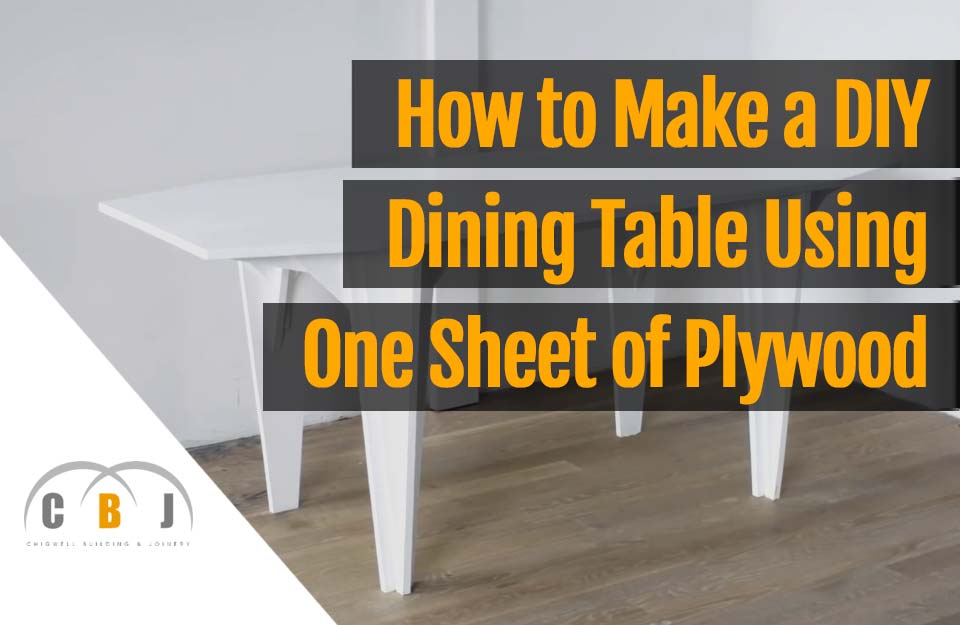News
How to Make a DIY Dining Table Using One Sheet of Plywood
Author Chigwell Building & Joinery
Date 04/12/2019
A high quality and useable table is something that very home can benefit from.
Making a table yourself is really simple.
You might never have thought about it, but it is far cheaper and more fun than buying a readymade table, especially when considering that it will only amount to a little time, basic tools and materials to build yourself.
The following article outlines how to go about it.
Read on or hit a jump link below to skip to a desired chapter:
Chapters
- Tools & Materials Required
- Preparation
- Measuring, Marking & Cutting
- Making the Legs
- Cutting the Table Top
- Attaching the Legs
- Finishing & Painting
- Conclusion
- See It In Action
Tools & Materials Required
You will need the following supplies:
- sheet of plywood, with a recommended thickness of 19mm (¾ inch).
- water-based protective topcoat
- paint
- sandpaper
- screws
- wood putty
- glue
- ruler
- pencil
- cordless drill
- circular saw
Preparation
Gather the supplies and tools listed above.
Then use a space where there is enough room where you can work.
Remember that some cleaning up will inevitably be required since cutting wood is required.
Then decide on the preferred dimensions of your dining table and draw a plan with all the measurements marked.
Once the cutting is completed, it is recommended to seal the plywood with the water-based protective topcoat.
Measuring, Marking & Cutting
You will need to cut the plywood with the circular blade.
It is best to mark out the angles using a ruler and pencil.
In this way you will just need to follow these markings with the guide on the circular saw.
This will greatly reduce inaccurate cuts or any mistakes.
Once the cutting is completed, it is important to take the time to sand all the pieces.
This can be done with a 220 grit sandpaper.
Obviously if you use a fresh saw blade the cuts will be cleaner, however a light sanding is always recommended to ensure neater edges.
Making the Legs
The legs are an important part of the table.
Mark the areas where you intend to place the legs, as some will prefer not to place them right at the corners of the table top, but slightly inwards.
Make sure you measure well so that they are equally away from one another.
It is best to glue together four different sets of pieces, and to reinforce them with screws.
Clamp the pieces together.
Allow the glue to cure on the first set of pieces and then proceed to combine them together to form a leg.
Obviously this process will need to be repeated for all of the legs.
Cutting the Table Top
You will have decided on the size of the table before.
A DIY table can be as sturdy as a ready-made one.
You do not need to worry about the area of the table top as long as you use sufficiently thick plywood sheets and ensure that the assembling is carried out carefully.
Clamp down a straight edge and then start cutting strips off.
These will be put to good use as supports for the underside.
Assembling the inner support frame for the table is probably one of the most important steps.
To do this well it is best to use triangular pieces of plywood and glue them to the support strips you cut earlier.
Glue and screw these pieces to the inside corners of the table’s legs.
Then, also glue the pieces you had cut off from the top corners to one another so as to create a couple of triangular braces that will serve well as additional supports for the table’s frame.
Glue them together and screw them for additional sturdiness, and then screw to the inside of the frame.
At this point, since the pieces were triangular, you might happen to notice gaps.
In that case simply plug these gaps with scrap pieces that you will surely have gathered during the cutting of the inner frame.
Attaching the Legs
Once the base has been completed, you can then glue and screw the inner frame pieces, which will connect the legs together, to each of the legs.
At this point you will have the lower part of the table completed.
Finishing & Painting
The last step is to glue the tabletop to the base of the table.
At this point we can say that the table is ready to go.
All you need to do is to glue the table top to the base, and while doing so it is best to use weights so as to hold down the table top tightly to the base while you allow the glue to cure.
Any holes that were left by the screws should be filled up with some wood filler.
Allow it to dry, and then sand it until it is flush with the plywood.
This will ensure a neater result.
It is also best to take the time to smoothen off the edges with the sandpaper, as well as round over the edges a bit.
In case you opt to paint your table, then that is the final step.
Obviously prior to painting, make sure that the sanding is all completed, and that you wipe off all the parts with a moistened cloth so as to remove any dust residue that will have been left after the sanding.
It is best to give two coats of paint for a neater result.
Using a roller should give a smoother, streak-free finish.
And there you have it. Your DIY dining table is all done!
Conclusion
As you may have noticed you do not require any expensive tools and materials to build a dining table out of a single sheet of plywood.
Besides, as long as you follow the guide above, you will not need to worry about not being able to complete it successfully.
Anyone can manage to build a dining table as long as the steps above are followed carefully.
Always exercise caution when cutting the wood pieces, and try to be as precise as possible so as to avoid any mistakes that could mess up the final result.
Other than that you can have a nicely designed dining table at a fraction of the cost you would have had to pay for a ready-made one.
See It In Action
This DIY tutorial is based on the awesome instructional video by HomeMade-Modern.com
Go check out the video on their YouTube channel and see just how easy it is to make a beautiful dining table from a single sheet of ply!


